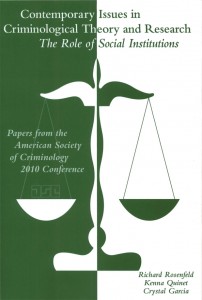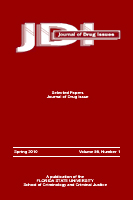FAITH & WORKS CONFERENCE, October 27-28, 2008NEWS RELEASE:DOJ Awards Grant to ISR
|
Baylor University’s Institute for Studies of Religion (ISR) and the Program on Prosocial Behavior received a $400,000 grant from the Office of Juvenile Justice and Delinquency Prevention (OJJDP) to establish a research initiative that examines the role religion plays in prosocial youth behavior. The grant began in the fall of 2006 and concluded in April of 2009.
Participating in the initiative were Dr. Rodney Stark, University Professor of the Social Sciences and co-director of ISR; Dr. Byron Johnson, professor of sociology and co-director of ISR as well as director of the Program on Prosocial Behavior; Dr. Christopher Bader, assistant professor of sociology, ISR fellow and co-principal investigator; Dr. Sung Joon Jang, associate professor of sociology at Louisiana State University and non-resident fellow at ISR; and Dr. Scott Desmond, assistant professor of sociology at Purdue University and non-resident fellow at ISR.
“For decades scholars have identified factors that predict antisocial behavior, especially crime. But surely it is at least as important to understand why kids turn into good citizens as to understand why they go bad,” Stark said. “Hardly any attention has been given to this side of the equation. What factors support positive, prosocial behavior? There is much more involved here than merely obeying the law. Why do people do admirable things? For example, why do they support charities, do volunteer work, return lost valuables or participate in civic activities? Of course, we already know some of the answers to these questions, but now we can really dig in.”
The federal grant from the OJJDP was a multidisciplinary initiative devoted specifically to understanding the role of religiousness, religiosity, religious institutions and congregations, as well as religious practices and beliefs, in promoting prosocial behavior among youth. The Program on Prosocial Behavior produced and encouraged ground-breaking quantitative and qualitative studies of the antecedents, correlates and factors associated with prosocial behavior.
“Put simply, there is a need for research that intentionally focuses our understanding on positive and prosocial outcomes,” Johnson said. “In essence, the field of crime and delinquency studies is badly skewed to the negative and in need of a major overhaul. What better place to initiate the shift in that mindset than here at Baylor?
Over the course of this two-year project on the Role of Religion Prosocial Religion and Youth Behavior, we have produced a number of important products and have achieved our aims as outlined in our original proposal to OJJDP. To follow we summarize these products and developments that have helped to significantly advance our knowledge of the role of religion in preventing delinquency as well as to more broadly advance the field of crime and delinquency studies regarding the place of religion not only as an important protective factor, but a key contributor to prosocial youth behavior.
- We have utilized some of the most important and respected datasets (e.g., National Survey of Children, National Longitudinal Study of Adolescent Health, National Education Longitudinal Study) to produce new and cutting-edge scholarship at the intersection of religion and delinquency, crime, and substance abuse.
- Our studies have identified and operationalized religious variables in different ways that may ultimately help both faith-based as well as secular programs attain critical competencies so that they can be effective partners in the prevention and/or amelioration of juvenile delinquency and youth violence in their communities.
- We have developed empirically informed scholarship that sheds new light on youth crime desistance.
- By drawing upon and testing the viability of religion measures within a number of different theoretical perspectives, we have taken an important step that will allow to consider more of an integrated approach to youth crime prevention that includes the role of religion and faith-based organizations in promoting prosocial behavior.
- We have published several journal articles in peer-reviewed journals. Each of these ground-breaking articles make important connections to the role of religion in prosocial youth behavior. (Please see box to the right)
- We are now completing a major meta-analysis that systematically and objectively reviews in a comprehensive the religion-delinquency literature between 1944 and 2008. W The meta-analysis will describe the state-of-the art and will be the foundational reference for any future research on this subject.
- We hosted a conference in San Antonio, this last October, where we presented findings of our OJJDP sponsored research. We have made several presentations at other conferences including the Academy of Criminal Justice Sciences and the American Society of Criminology.
- We also highlighted preliminary findings of our OJJDP at a conference co-sponsored by Child Trends and the Heritage Foundation in Washington, DC in October of 2007.








